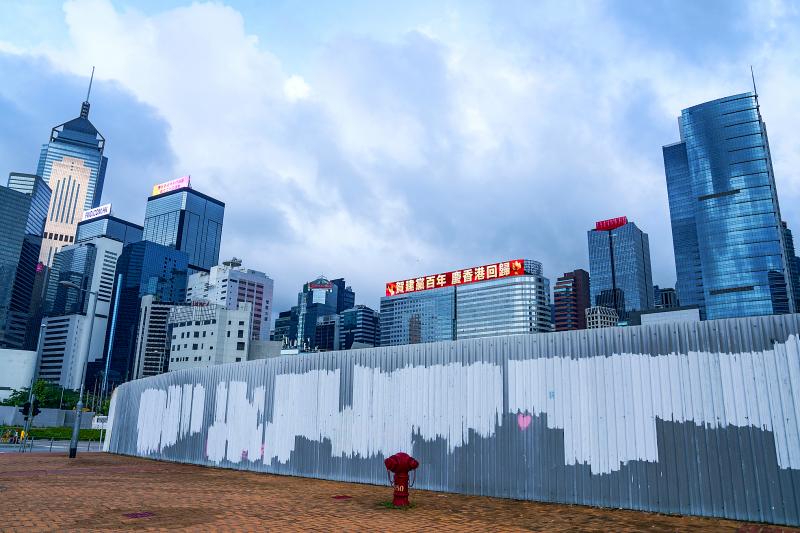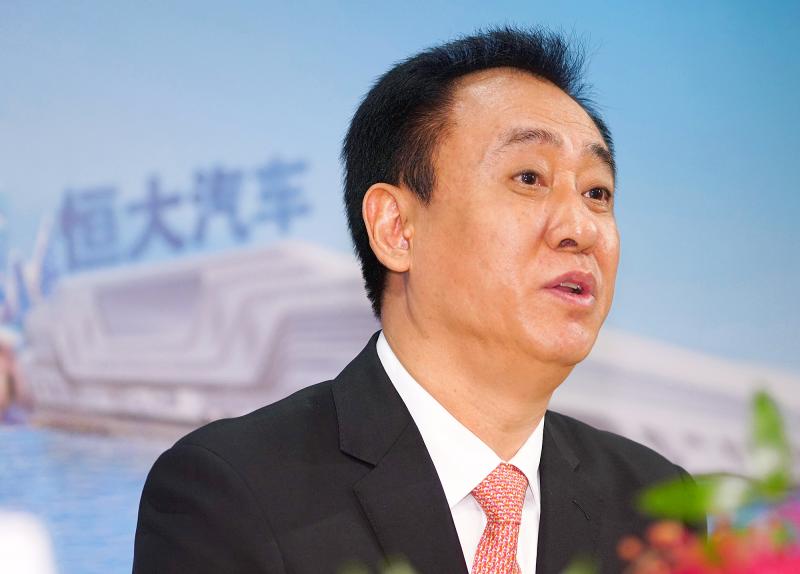From rural poverty to real estate billions, the fortunes of Evergrande Group (恆大集團) chairman Xu Jiayin (許家印) tracked China’s runaway growth for much of the past two decades — but now he is battling to save his conglomerate from a quagmire of debt.
The 62-year-old was at one point China’s richest man, with a taste for luxury labels, exclusive yachts and a nose for praising the Communist Party that steered the economy to a home ownership boom.
However, Evergrande is sagging under hundreds of billions of dollars of debt as fears mount of an imminent collapse that could ricochet across the world’s second-biggest economy.

Photo: Bloomberg
“China’s property developers — and their creditors — appear to be approaching a reckoning,” analysts at Capital Economics Ltd said in a note.
They warned that Evergrande is “close to collapse,” with large losses looming for banks, bondholders and home buyers.
Total liabilities had swelled to 1.97 trillion yuan (US$305.7 billion), the embattled group said last week, warning of the risk of default.

Photo: China News Service via CNA
Evergrande started to falter under the new “three red lines,” which were in August last year imposed on developers amid a crackdown by the Chinese government — forcing the group to offload properties at increasingly steep discounts.
Xu’s ascent mirrored China, rocketing from a largely rural and impoverished society to the gargantuan economy it is today.
The billionaire, whose mother died when he was one year old, recalled in a 2017 speech how he ate just sweet potatoes and steamed bread throughout his school years.
“The sheets I laid, the quilts I covered and the clothes I wore were all covered with piles of patches,” Xu said. “At that time, my greatest wish was to go out of the countryside, find a job and be able to eat better food.”
After leaving school in 1976 — the end of the decade-long Cultural Revolution — he struggled to find work.
As colleges reopened, Xu studied metallurgy and was later assigned to a state-run steel factory.
He left in 1992 for Shenzhen, the buzzing heart of China’s reform and opening-up experiment in the 1990s, before founding Evergrande in 1996.
All 323 apartments in the firm’s first completed project sold in half a day, and raked in 80 million yuan.
Evergrande threw itself into mass development, building in-demand apartments across China and capitalizing on its rapid wealth accumulation.
The group in 2009 listed in Hong Kong, raising HK$70.5 billion (US$9.1 billion at the current exchange rate) in its initial public offering, making it China’s largest private real estate company and Xu the country’s richest man with a net worth of 42.2 billion yuan.
In 2010, Xu bought an embattled Guangzhou soccer team, renaming it Guangzhou Evergrande and pouring money into world-class players and coaches.
A soccer novice when he bought the club, Xu helped the team win eight league championships.
He also cracked down on bad behavior, reportedly fining a player who challenged a referee and introducing the “five musts” — including “players must obey the referee’s judgement unconditionally.”
The group also invested in electric vehicles, tourism and bottled water.
According to the SuperYachtFan Web site, Xu is the owner of a US$60 million yacht.
He also has a private jet, which Australian media reported he used for scouting out Sydney development opportunities in 2014.
Xu also became known for a love of luxury labels, particularly French brand Hermes — earning the nickname “Belt Xu” after wearing a Hermes belt for the national political congress in 2012.
Some have speculated that his success has come from useful close relationships, including with the brother of former Chinese premier Wen Jiabao (溫家寶), but Xu has attributed his success to education — and the Chinese Communist Party.
“Without the resumption of the national college entrance examination, I am still in the countryside. Without a state grant of 14 yuan, I couldn’t go to university. Without the country’s reform and opening up, Evergrande is not what it is today,” he said. “Everything of Evergrande is given by the party, the state and the society.”
However, Xu is facing a government crackdown on extensive wealth, with Chinese President Xi Jinping (習近平) leading the country’s drive for “common prosperity” against billionaires and tech firms.
In 2017, the Bloomberg Billionaires Index estimated Xu’s wealth at US$43 billion — but that is now down to less than US$9 billion, having lost an eye-watering US$14.5 billion since the start of the year alone as the value of Evergrande collapsed.

South Korea’s equity benchmark yesterday crossed a new milestone just a month after surpassing the once-unthinkable 5,000 mark as surging global memory demand powers the country’s biggest chipmakers. The KOSPI advanced as much as 2.6 percent to a record 6,123, with Samsung Electronics Co and SK Hynix Inc each gaining more than 2 percent. With the benchmark now up 45 percent this year, South Korea’s stock market capitalization has also moved past France’s, following last month’s overtaking of Germany’s. Long overlooked by foreign funds, despite being undervalued, South Korean stocks have now emerged as clear winners in the global market. The so-called “artificial intelligence

CONFUSION: Taiwan, Japan and other big exporters are cautiously monitoring the situation, while analysts said more Trump responses ate likely after his loss in court US trading partners in Asia started weighing fresh uncertainties yesterday after President Donald Trump vowed to impose a new tariff on imports, hours after the Supreme Court struck down many of the sweeping levies he used to launch a global trade war. The court’s ruling invalidated a number of tariffs that the Trump administration had imposed on Asian export powerhouses from China and South Korea to Japan and Taiwan, the world’s largest chip maker and a key player in tech supply chains. Within hours, Trump said he would impose a new 10 percent duty on US imports from all countries starting on

Chinese artificial intelligence (AI) start-up DeepSeek’s (深度求索) latest AI model, set to be released as soon as next week, was trained on Nvidia Corp’s most advanced AI chip, the Blackwell, a senior official of US President Donald Trump’s administration said on Monday, in what could represent a violation of US export controls. The US believes DeepSeek will remove the technical indicators that might reveal its use of American AI chips, the official said, adding that the Blackwells are likely clustered at its data center in Inner Mongolia, an autonomous region of China. The person declined to say how the US government received

Like many of us who are mindful of our plastic consumption, Beth Gardiner would take her own bags to the supermarket and be annoyed whenever she forgot to do so. Out without her refillable bottle, she would avoid buying bottled water. “Here I am, in my own little life, worrying about that and trying to use less plastic,” she says. Then she read an article in this newspaper, just over eight years ago, and discovered that fossil fuel companies had plowed more than US$180 billion into plastic plants in the US since 2010. “It was a kick in the teeth,” Gardiner